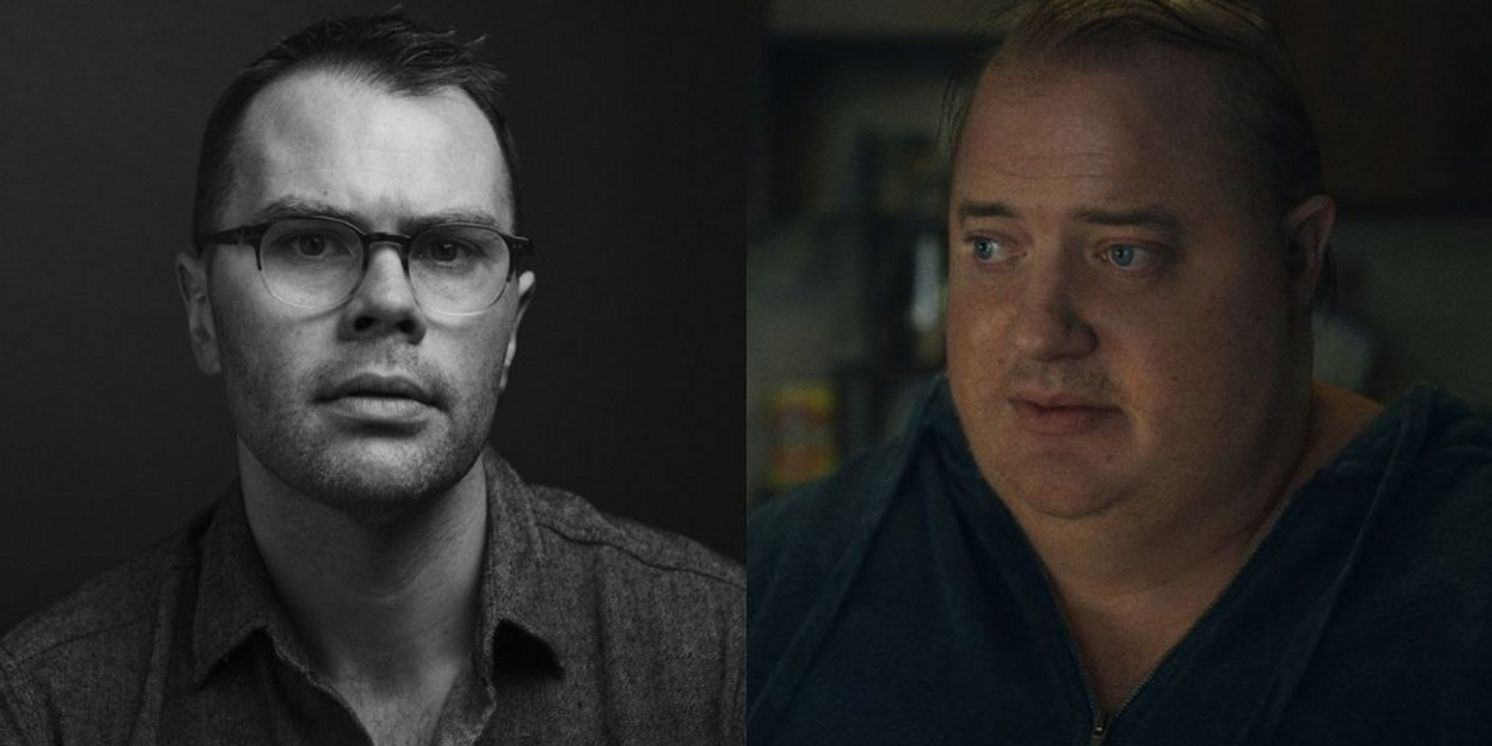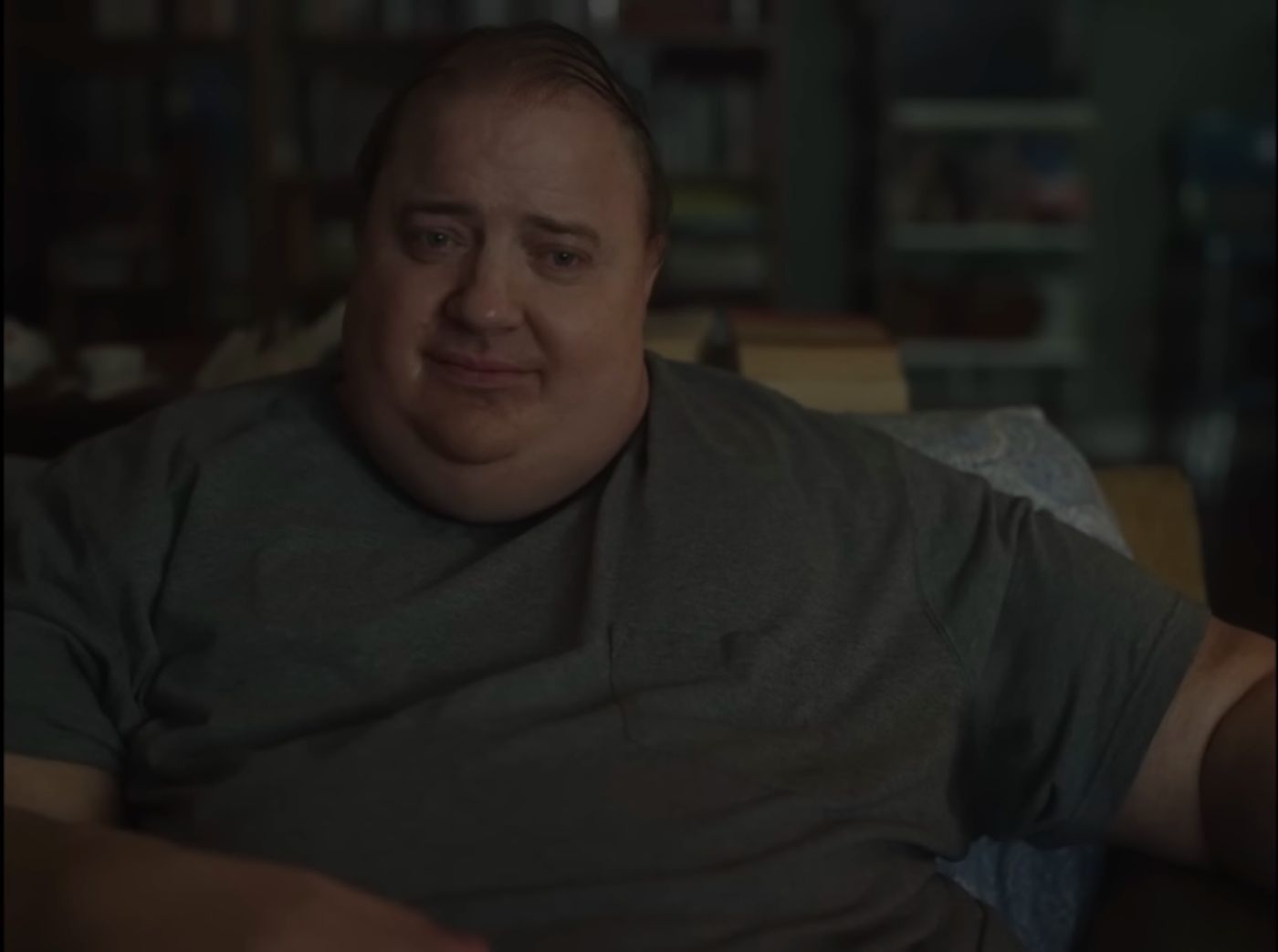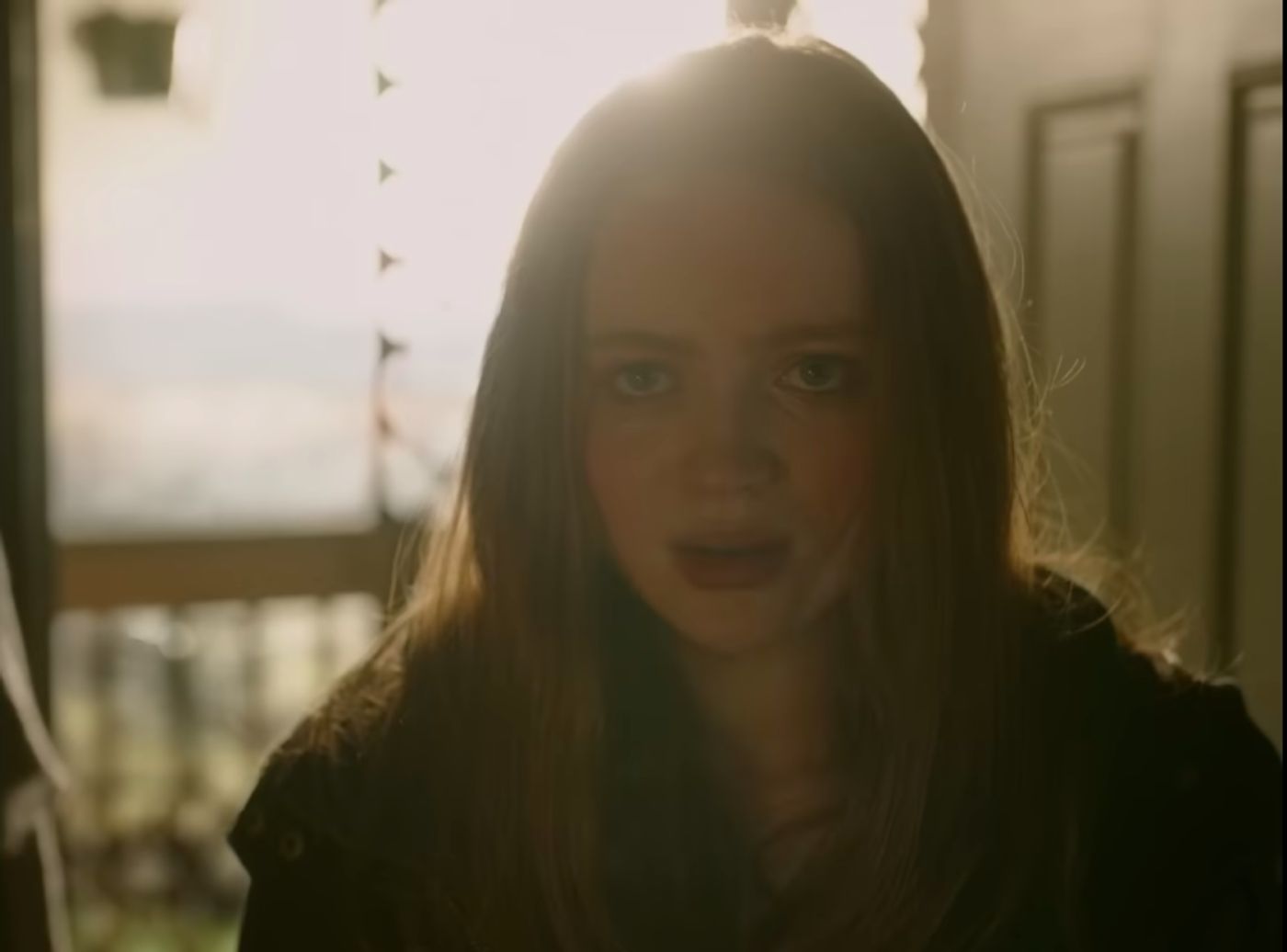Interview: Playwright Samuel D. Hunter Discusses Adapting THE WHALE Into a Film
The Whale will be released in theaters tomorrow, December 9.

In 2012, director Darren Aronofsky saw Samuel D. Hunter's The Whale Off-Broadway. Since then, the pair worked to adapt the play into a film adaptation, facing obstacles like a tough search to cast the film's lead role and a global pandemic.
Now, 10 years later, The Whale will be released in theaters tomorrow, December 9.
The story follows a reclusive English teacher who attempts to reconnect with his estranged teenage daughter. The film stars Brendan Fraser, Sadie Sink, Hong Chau, Ty Simpkins, and Samantha Morton.
BroadwayWorld caught up with Hunter after the film's premiere to discuss how he adapted the play into a film, how it was rehearsed like a theatrical production, Brendan Fraser's acclaimed performance, and more.
What was your initial reaction when Darren Aronofsky originally said he wanted to turn THE WHALE into a film?
I mean, it was head spinning. I hadn't even known that Darren had seen it. This was almost 10 years ago to the day, I think he saw it on November 29th, 2012. So I just get this call being like, "He wants to meet with you to talk about film rights," and that's all that I knew. And I was like, "Okay, that could mean a lot of different things." So I sat down with him and it was clear that he had some interest in directing it, but I think neither of us really knew exactly what it wanted to be. We just kind of made it a point to meet again after I had done some thinking.
I did some initial thinking about like, "What does this wanna be?" You know, the natural thing you would do when translating a play would be like, open it up and add characters, add settings, add flashbacks, the whole thing and every time I kind of ideated on that for myself, I was just like, "I don't know what this is anymore." It just seems like this sprawl doesn't add anything. If anything, it takes away the sort of fundamental quality of the story, which is like going into this room and spending time with this guy in a really deep and meaningful way. I was also like, "I'm not gonna tell Darren how to make a movie," so I have no idea, like, how this is gonna happen.
But in one of our early meetings without me saying anything, he said, "Let's keep it in the apartment ." I was really glad that he said that. I think about films like Who's Afraid of Virginia Wolf?, which is one of my favorite films. That's very much the play, you know? I think there's this kind of unapologetic quality to it that Darren was really interested in. I mean, he's a very unapologetic filmmaker. So he was gonna make the right version of it, but the difficult version of it.
It was over many, many years and like so many times I was like, "Okay, this is dead. This is like deader than dead." I remember the last time that he extended the option, he called me in like 2019, I think, and he was like, "Can I please just have the option for, you know, 18 more months or whatever?" And like at that point I was just sort of like, fine, go ahead. Like, why not? I really was just like, "This is ceremonial at this point."
Then I got a call from him and he was like, "What about Brendan Fraser?" That was like the first name that he had ever brought to me. I knew that he had looked at a ton of people, including the original casts from Denver and Chicago and New York, but this was the first time that he was like, "I think I know how to make this." And then the pandemic hit. So that slows down again. But weirdly, this story about like isolation, in a lot of ways my plays are about isolation and connection, but like, making this in the middle of a pandemic was actually like, I don't wanna say helpful, but it definitely like resonated differently. You know, it was like the first thing I had done with other people, going on set for this movie.

Since it had been in development for a really long time, how did the adaption continue to change in your mind? Did it change throughout those years while you were waiting for the film to start?
Yeah. There, there was a lot of drafts. I mean, I think like I had the initial early translations of it, but the more that I worked on it and the more I was like, "You know what, I think there's a visual story to be told here. I think there's a visual story to be told there."
It was as late as during the pandemic that I had the idea for the second bedroom. That was a pretty late edition. That was really because in the play, the way that the the information about Charlie's lover comes across is he has a monologue to Thomas about it. Then you kind of get a new version of that monologue from Liz and you realize they're talking about the same person. But the way that it falls out in the film is that Charlie doesn't have that monologue. So really the second bedroom is telling that story of this person in his life, this huge loss. But it's told entirely visually in the film, which is really exciting. So there's a lot of stuff like that along the way.
And Brendan Fraser is just so good at telling that story with just his face. You said the film really clicked when he was brought on board?
Yeah, I think even though the script was getting better and I had faith in the script as a piece of filmmaking, it was really like, "Well, who's Charlie?" Like, this is gonna like live or die by whoever does this role. I'd seen a lot of people do this role, most notably Schuler Hensley who performed it amazingly at Playwrights Horizons. So I knew, but I, you know, traveled around. It originated in Denver with a wonderful actor named Tom Allen Robbins, then it went to New York, then it went to LA and then Chicago. And entirely different teams on all four of those productions so I had seen it done many different ways. I had seen the pitfalls, I had seen the important things about it.
Fom the very first reading that we did with Brandon, it was just like, "Oh my God, he's got it." Like every single note, he's hitting. Darren had rented a theater and we did just a reading of it. Sadie [Sink] was in the reading too, actually.
So then, were you on set with them while they were filming the movie?
I was, yeah, I was on set all the time. The entire time. I lived up in Newbergh for nearly three months and that also included a three week rehearsal process, which is really, really uncommon for a film to have basically three weeks of rehearsing. It as one would rehearse a play. I mean, Darren like had them tape out set. The only difference between rehearsing this as a play and this as a film, is like, there's no audience to play to. We're just talking about where to put the camera. But yeah, and like Maddy Batik was there the entire time too, planning out shots. We were doing table work. It was great. Darren kind of declared us a theater company on day one of rehearsal. It was three weeks until any cameras got turned on.
So in that three weeks and then while you were filming the movie, were you able to make tweaks to the screenplay while you saw it coming to life?
I did. A lot of it was what I see Darren, I see Brenda telling this story visually. I see Hong story telling story visually. What you don't need, maybe need that. Then there was some things that I had cut because I was like, "Is this gonna work better in a play than it would in a screenplay?" But actually it ended up being added back in beause I was like, "You know what? We're losing something here without this."
Most notably, my whole thing throughout this process was like, we cannot lose the humor. We absolutely cannot lose the humor. Like this is not what it is without the humor and without the light, you know? Darren's movies don't have a lot of humor in them. So this was kind of new for him in certain ways.
Then there was just a lot of stuff like I remember there was a scene where Charlie finally gets Ellie to crack a little bit, and she agrees to make him lunch in kind of an act of love. A very, very veiled act of love. And he sees it and the way Brendan was playing that scene, I was just like, "Oh my God. He's like, radiating this intense joy." So I ended up writing him a few lines kinda on the fly. I forget exactly what they were, something about like, "I couldn't ask for a better daughter," or something like that. Just because like he was doing it and I was like, let's give him some texts to scaffold this amazing thing he's doing.

So the play originally came out in 2012, but the film takes place around the 2016 election. What were your motivations in updating the play for that specific period in time?
Well, I guess I wrote the play first on like 2009, 2010. So the play is basically set then. When we were talking, like that's a very specific thing. Even though it was simply the year that I wrote it, there was no meaning behind setting it in in 2010. So we were like, "Well, if it doesn't need to be set then, when does it wanna be set?" We thought like, "Is it contemporary?" But then it was like, well, no because then everybody would be wearing masks, especially Liz as a healthcare worker, and people would be talking about the pandemic, and it was just like, this is not that movie. So the more we talked about it, we really started to emerge about 2016 and specifically around the election, even though it's not a political commentary.
I do think that there's something about all of these characters are kind of on the precipice of something, you know what I mean? Like, Thomas comes in with all this end of times energy and Charlie's in his own version of end times and Ellie might be failing out of school, Liz's co-dependent behavior is kind of coming to a head. Everything is kind of on the precipice for these characters. It kind of felt nice to set it in a time where the country was on some huge precipice. I just really loved how like, when you hear that talk on the TV about the election, suddenly it's just like, the world gets so much bigger and you're like, "Oh, right." This is this tiny, tiny story that's happening in this vast, vast country that's about to really fundamentally change.
There's a lot to take away from the film for audiences, but what do you want people to walk away from the movie feeling?
I think that with this play, and I think I've written probably around 15 other plays since I wrote this play, and I think there's something about them that they're very uncynical and very kind of earnest, you know what I mean? That rubs some people the wrong way, like some people really don't like that. I think it's kind of how I, with my life, just like wearing my heart on my sleeve and I think my plays kind of wear their hearts on their sleeves, too. So they're easy to adapt because they're right there.
What I hope people, if they go on the ride and they kind of meet it halfway, I hope people come out thinking that there's value in having faith in other people even though it's hard. Do you know what I mean? Having faith in other people, even now more so than when I wrote the play, is a really difficult, complicated endeavor that takes a lot of work. But I feel, especially now that I'm a dad, my husband and I adopted kids five years ago, and now it's like, I don't have the luxury of being cynical. I cannot usher my kid into a cynical world. It's kinda my job.
I do think that faith is hard won, and it's not easy when you don't have the easy answers that you can arrive at through, religion or a set of cultural values that organizes everything. This play exists in a way where there's not a really concrete moral compass for everybody. So I hope people come out of it thinking that, for those of us like me who live in that complicated world and don't have the dogma, whether that be religion or otherwise, that it's still like there's a way forward, there's like a path forward, even if it's difficult.
Watch the trailer for The Whale here:
Videos

